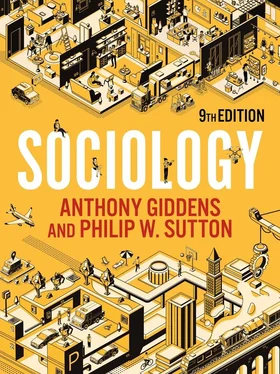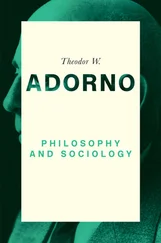How aware are you of risks in your everyday life? Do you engage in any ‘risk-taking activities’ and, if so, why do you do it? Is risk always a negative part of modern life or can you think of any positive aspects?
Consumerism and environmental damage
One important ‘manufactured risk’ is environmental damage caused by patterns of mass consumption. Consumption refers to the goods, services, energy and resources that are used by people, and it is a phenomenon with both positive and negative dimensions. On the one hand, rising levels of consumption around the world mean that people are living under better conditions than in the past. On the other hand, mass consumption has negative impacts too. Consumption patterns can damage the environmental resource base and exacerbate patterns of inequality.
It has been argued that industrial capitalism sets societies on a ‘treadmill of production’ leading to environmental damage, using up natural resources at a rapid rate and generating high levels of pollution and waste (Schnaiberg 1980). However, in the twentieth century it was modern consumerism which kept that treadmill running faster in this direction (Bell 2011). Consumption is something that human beings have to engage in to survive, but modern consumption is very different from earlier forms.
Mass production must be accompanied by large-scale consumption. The products of industry have to be bought and consumed, though producing and consuming may well be carried out in geographically distant locations. Products are made wherever it is cheapest to do so and consumed wherever the best price can be gained. In the past sixty years or so, this has led to industrial production moving to developing countries. The rapid transformation of the newly industrializing countries (NICs), such as Hong Kong, South Korea, Singapore and Taiwan in the 1970s and recent industrial development in India, China and Malaysia, testifies to this, which is part of the globalization process.
Sociologists also view consumerism as a way of thinking, a mentality or even an ideology (Corrigan 1997; Campbell 1992). We can understand this aspect if we ask why people continually consume and want to consume. Perhaps it is simply because consumer goods have ‘use-value’ for people, helping to save them time and effort. But luxury items fit this explanation less well. They show another side to modern consumerism – its role in the social status competition within society (see chapter 12, ‘Social Interaction and Daily Life’). Differentiated mass consumption allows for complex, fine-grained distinctions to be made according to the styles and fashions of the day. People may be prepared to pay a premium for the latest fashions because these products allow them to say something about themselves, to communicate their status or aspirations in a highly visible way. Even products with a clear use-value, such as clothes, are also fashionable items that are discarded and replaced before their ‘use-value’ has expired. Large amounts of such fashion-fuelled waste increase pressure on the environment.
Over time, consumer products become embedded into the routines of everyday life and are taken for granted. When this happens, it becomes difficult to think there is an alternative. Concerns about plastic pollution and its effects on marine life led to charging for plastic carrier bags and the promotion of stronger, ‘bags for life’ aimed at breaking shoppers’ routine expectation of free plastic bags and educating them at the same time. This is a simple example of targeted, pro-environment behaviour modification. Similar campaigns continue today in relation to ‘fast-coffee’ cups, straws and lids and a range of plastic packaging from major retail chains.
Decarbonizing the ‘car system’?
Perhaps the best example of an environmentally damaging consumer product is the motor vehicle, particularly the private car (Lucas et al. 2011). Many households have one, two, or more cars, and people use them even for very short trips to the shops, taking children to school or visiting nearby friends and relatives. But large-scale car-ownership and use generates large amounts of pollution and waste and is a major contributor to greenhouse gases. Why has it proved so difficult to reduce our use of the car?
Most drivers are extremely reluctant to give up the family car, 4 × 4, SUV or small hatchback on purely environmental grounds, despite a growing body of evidence demonstrating the negative aspects of private car-ownership. Thousands of deaths are due to low-level vehicle pollution in urban areas, and residential streets are blighted by mass vehicle ownership, yet the private car remains deeply enmeshed in our daily lives (Mattioli 2014). A partial explanation of this is that the car is extremely functional for the conduct of modern life. Many cities have been built around vehicle movements rather than cycling or walking, and, as Shove and her colleagues argue, cars are ‘[a] consequence of the extent to which driving has become integral to the conduct of an increasing range of social practices including shopping, commuting and getting to school’ (Shove et al.: 2015: 275).
One survey of attitudes to car-ownership found a range of consumer types among visitors to National Trust properties in the north-west of England (Anable 2005). The largest group consisted of Malcontented Motorists . They are unhappy with many aspects of their car use but feel that public transport has too many constraints to be a genuine alternative, so they do not switch. Second are Complacent Car Addicts , who accept that there are alternatives to using the car but do not feel any pressing moral imperative to change. Third are Aspiring Environmentalists . This group has already reduced their usage but feel the car has advantages that force them not to give it up altogether. Fourth are Die-hard Drivers , who feel they have a right to drive, enjoy driving and have negative feelings towards other modes of transportation, such as buses and trains. Fifth, Car-less Crusaders have given up their cars for environmental reasons and see alternative modes of travel in a positive light. Last are the Reluctant Riders , who use public transport but would prefer to use a car; however, for a variety of reasons, such as health problems, they cannot do this, but will accept lifts from others. This study shows that blanket appeals to an emerging environmental awareness to promote public transport use and a shift to electric cars are likely to fail. Instead, ‘the segmentation approach illustrates that policy interventions need to be responsive to the different motivations and constraints of the sub-groups’ (ibid.: 77).
Some sociologists argue that, seen in the long term, the ‘century of the car’ may be coming to an end anyway, as oil supplies have peaked, the mitigation of global warming is leading to a push for new, ‘low-carbon’ technologies, and rising population levels make mass individual car-ownership unsustainable (Dennis and Urry 2009). The current shift towards electric vehicles, particularly cars, vans and buses, may offer a way of radically cutting CO 2emissions while maintaining the freedom of movement that many people have grown used to.
USING YOUR SOCIOLOGICAL IMAGINATION
5.3 The car is dead – long live the car?
In the UK, transport emissions accounted for around 28 per cent of greenhouse gas emissions in 2016, while cars, vans and HGVs made up some 87 per cent of these (Committee on Climate Change 2018: 150). Encouraging and facilitating the move away from petrol and diesel to electric cars would therefore make a major contribution to hitting the UK’s target of net zero CO 2emissions by 2050. And though electric car sales are increasing, by 2020 the take-up was not rapid.
Читать дальше












